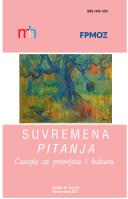Visokoškolske knjižnice i informacijska pismenost
University Libraries and Computer Literacy
Author(s): Silvana Marić Tokić, Sanja LedićSubject(s): Library operations and management, Higher Education , ICT Information and Communications Technologies, Sociology of Education
Published by: Matica hrvatska Mostar
Keywords: information literacy; university libraries; continuing education; education; information; Bologna Process; guidelines for information literacy;
Summary/Abstract: The information age or the information society has brought a turning point in all segments of human life. The information science has become one of the main elements of the development and economy, politics, culture, but also in education. The need for acquiring and use of information and various sources that convey that information, has brought to a new kind of learning – continuing education. Libraries and librarianship are an important part of society and as such they have to follow the contemporary courses. Various kinds of information, various storage media, the growing quantity of such information, their use – all these are the problems the user of such information is likely to encounter when trying to use it. This paper presents the role of higher school libraries, their tasks and their importance as well as the need for continuing education. Through new processes and new ideas appearing in the information age like the Bologna Process and information literacy and computer literacy but also a number of other forms, the very role of college libraries and librarians is changing. In describing the classification and tasks of higher school libraries we tried to point to their indispensable role in the information society. Various types of publications and their storage as well as the increased number of jobs librarians are involved in do not allow librarianship to remain outside the information/communication/technological developments. The Paper presents the development of the term information literacy since the mid 20th century onwards, and the connection of this term with librarianship. The information boom and the information chaos as well as the growing importance if information bring about the appearance of new forms of literacy including the information literacy. The research carried out among the student population has shown that students are deficient in information literacy. As educational institutions, libraries take over the role of introducing information literacy and, by following the technological trends, of teaching the students how to come by the relevant information. Through the closing part of the Paper we tried to present briefly “The Guidelines for Information Literacy in Continuing Education” prepared by the then president of the IFLA Section for Information Literacy Jesus Lau. The Paper has shown the importance of college libraries and librarians in the information literacy of students through the need for the continuing education.
Journal: Suvremena pitanja
- Issue Year: 2017
- Issue No: 23
- Page Range: 22-41
- Page Count: 20
- Language: Croatian

